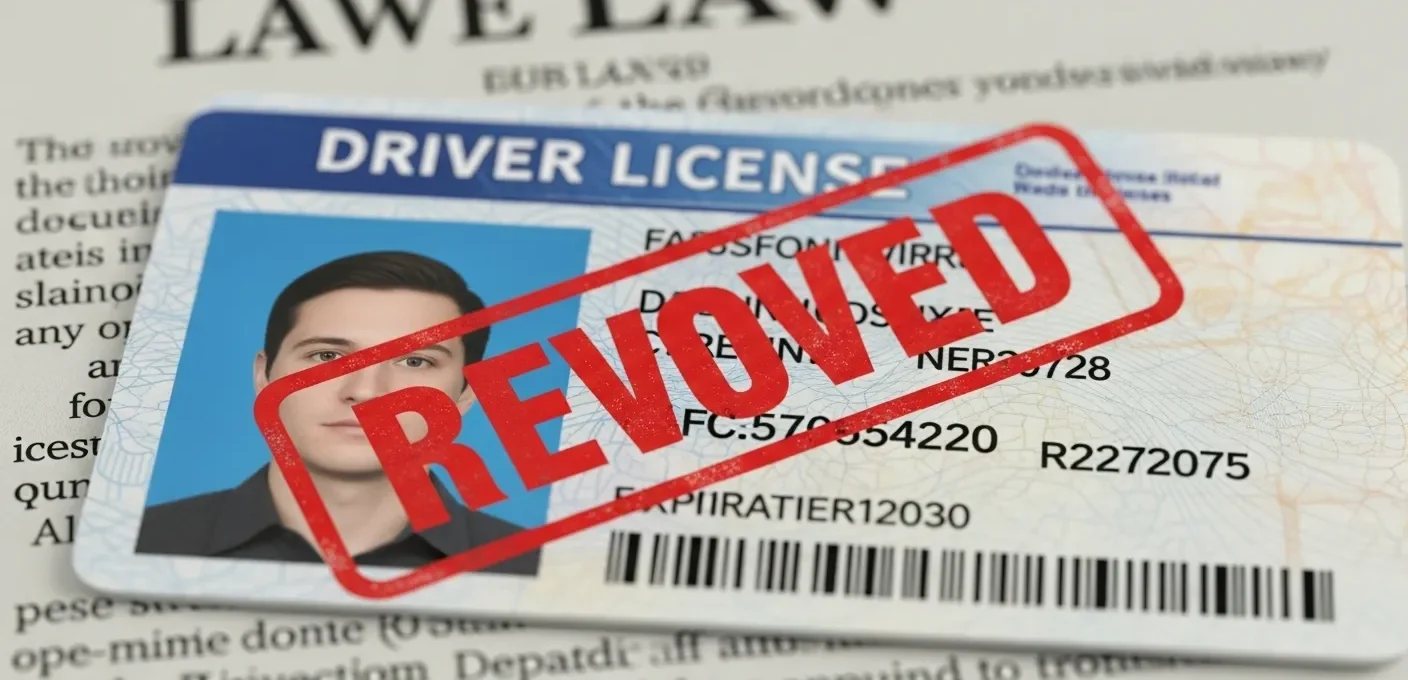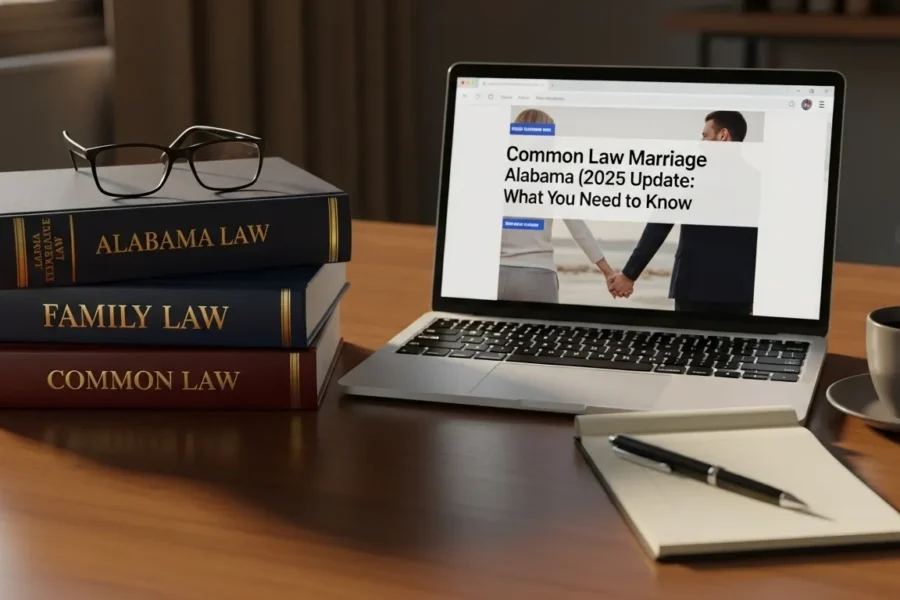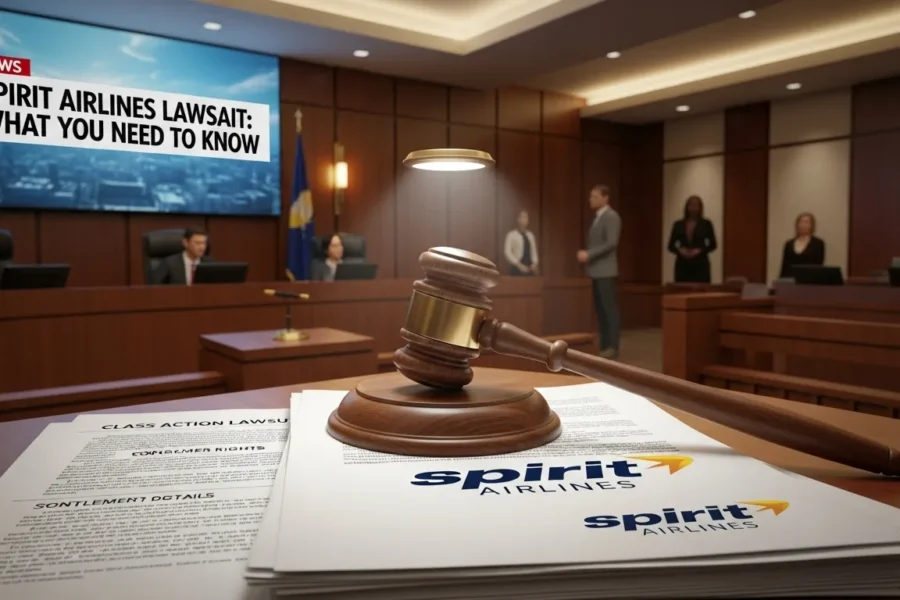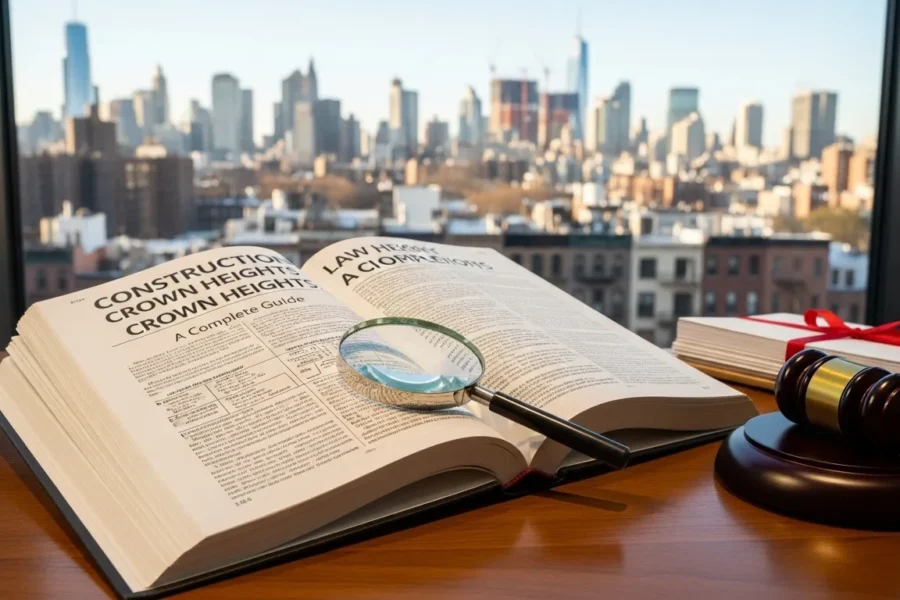Table of Contents
Starting with the Basics
I think it’s important to start simple. A driver’s license is not just a card it’s a permission slip from the state saying you can legally drive. But this privilege can be taken away if you break serious traffic laws. Many states use what’s known as a “driver’s license suspension rules
” rule, where multiple violations can lead to suspension or even revocation of a license.
What Counts as a Strike?
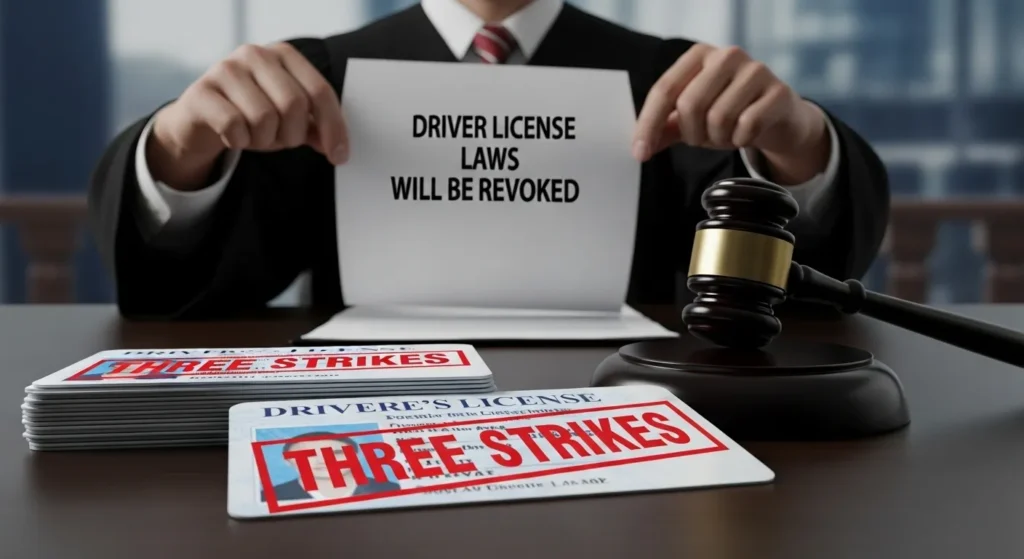
We often hear people say “strike one, strike two, strike three you’re out.” On the road, strikes usually mean repeated violations. These include:
- Driving Under the Influence (DUI penalties explained
) - Reckless or aggressive driving
- Driving without insurance
- Repeated red-light violations
They add up quickly. A single DUI might suspend your license. Get three in a certain time frame, and you could lose it entirely.
Suspension vs. Revocation
They may sound similar, but they aren’t. Suspension means your license is paused for a set period. Revocation means your license is canceled, and you must reapply.
- Hard suspension: No driving allowed at all.
- Soft suspension: Some limited driving allowed, usually for work or school.
Revocation is much tougher. You often need to pay high fees, complete courses, sometimes retake tests, and prove insurance coverage before applying again.
Why Lawmakers Push Three Strikes Rules
We see why lawmakers want strict rules. Assemblyman Jim Tedisco in New York, for example, pushed a law to permanently revoke licenses of anyone convicted of DUI three times. His idea was that removing the license stops the problem. But experts say that’s not how it works in reality.
The Problem with Taking Licenses Away
They argue most people don’t stop driving when their license is revoked. Instead, they drive illegally. This leads to bigger problems:
- More uninsured drivers on the road
- Higher chances of high-speed police chases
- More risk to innocent drivers
In fact, in New York, one of the most common crimes is aggravated unlicensed operation—basically driving without a valid license.
Alternative Approaches
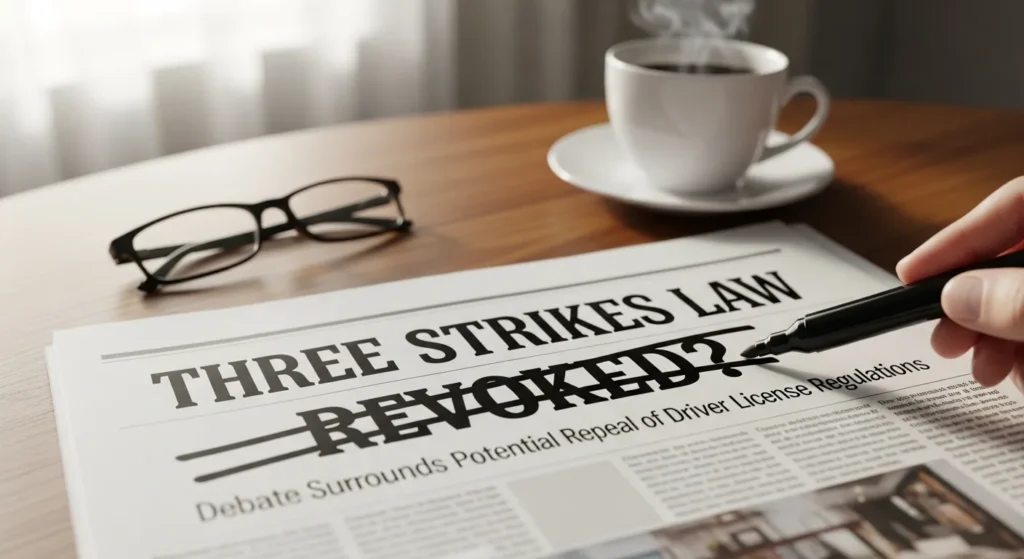
Some attorneys suggest smarter solutions. One idea is lifetime ignition interlock devices (IIDs) for repeat DUI offenders.
- An IID checks your breath alcohol before starting the car.
- It can even keep checking while you drive.
- If your blood alcohol content (BAC) is over 0.025%, the car won’t start.
This way, people can still drive to work, but only if they are sober. If they break this rule, stronger penalties like prison time are suggested.
Looking at Washington State
In Washington, rules are strict. A DUI arrest alone can suspend a license for 90 days to two years. After conviction, revocation can last up to four years.
- For DUI, the only way back on the road is with an Ignition Interlock License (IIL).
- For reckless driving or tickets, you may qualify for an Occupational or Restricted License (ORL).
- Drivers must also show proof of financial responsibility with an SR-22 insurance filing.
Clearly, the focus is on keeping unsafe drivers off the road while still allowing limited, safe driving.
The Impact on Daily Life
We know that losing a license can change everything. Without it, people may:
- Lose their jobs if no public transport is available
- Struggle with finances due to fines and court costs
- Pay much higher insurance rates if they ever get reinstated
This is why some argue that permanent revocation is too harsh, especially in areas without buses or trains.
National Guidelines and Safety Groups
Groups like the NHTSA (National Highway Traffic Safety Administration) and AAA push for strong DUI prevention methods, but they also focus on education and awareness. They stress that punishment alone doesn’t stop risky behavior it must be combined with resources and alternatives.
The National Driver Register is another key tool. It’s a database that helps states track drivers whose licenses are revoked or suspended in other states. This keeps unsafe drivers from moving and getting a new license somewhere else.
Three Strikes Beyond Traffic Laws
We also need to understand that “traffic violation points system
” is not only about driver’s licenses. It began in criminal law. Washington State passed the first version in 1993, followed by California in 1994.
- A third serious felony could mean life in prison without parole.
- Crimes covered included murder, rape, robbery, kidnapping, and arson.
- The federal government also uses this approach for violent felonies.
The idea spread into traffic laws as part of the same mindset: repeat offenders should face tougher consequences.
Reforms Being Debated
We see a shift now. Some lawmakers are asking: Is permanent revocation fair? Alternatives being discussed include:
- Longer suspensions instead of permanent bans
- Mandatory driving safety courses
- Higher fines for repeat offenders
- Expanding ignition interlock programs
The goal is to keep roads safe without creating an “army of unlicensed, uninsured drivers.”
Real-Life Local Impact
Take Aurora as an example. Their local “three strikes” traffic law led to 638 cars being impounded and 38 auctioned. This shows how harsh rules can ripple into communities, affecting not just drivers but families and local economies.
Reinstating a Revoked License
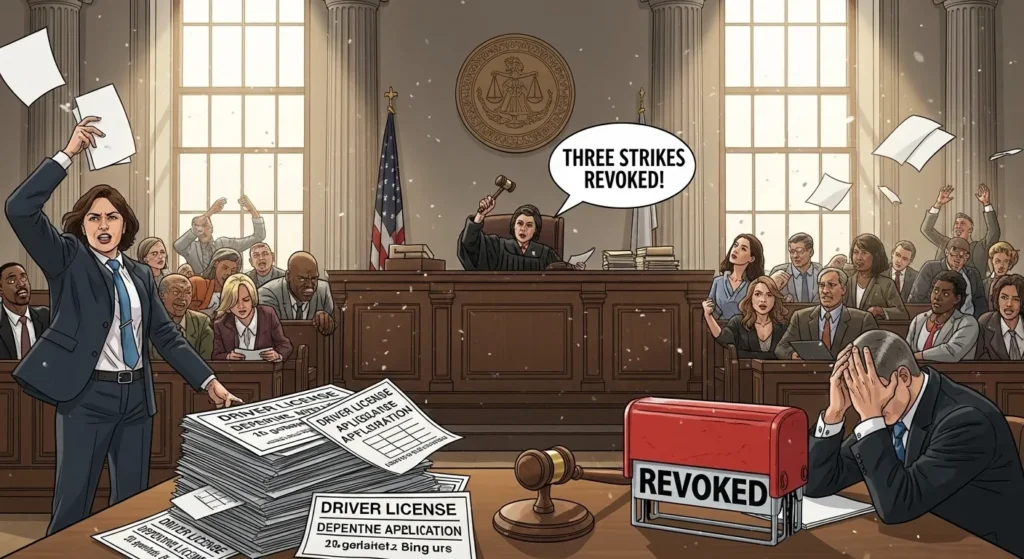
When someone’s license is revoked, getting it back is not easy. It usually means:
- Waiting the full revocation period
- Applying through the state DMV
- Paying fines and fees
- Proving insurance with an SR-22
- Sometimes retaking written and road tests
Even then, approval isn’t guaranteed. If the DMV thinks you’re still a risk, you may be denied.
Resources for Drivers
People facing revocation can find help through:
- Official DMV websites for forms and requirements
- State government traffic laws posted online
- AAA road safety resources offering education and support
- NHTSA guidelines on impaired driving prevention
Knowing your rights and responsibilities is key.
Final Thoughts
We need to admit the truth: three strikes in driver license laws are real and active in most states. But whether they truly stop dangerous driving is up for debate. Revocation sounds tough, but often it just pushes people to drive illegally. Alternatives like ignition interlock devices may offer a smarter path forward.
If you or someone you know is dealing with license suspension or revocation, the best step is to learn your state’s rules, explore restricted license options, and consider safer driving habits. After all, the ultimate goal is not punishment it’s keeping everyone on the road safe.
FAQs
What is a restricted driver’s license in Washington state?
It’s a license that lets you drive only for work, school, or essential needs under certain conditions.
2. Can you drive around with a restricted license?
Yes, but only for approved purposes like commuting to work, school, or medical visits.
3. How many strikes before your license is revoked?
In many states, three major violations within a set time can lead to revocation.
4. What happens after a license revocation?
You must wait the revocation period, reapply, pay fees, and sometimes retake driving tests.
5. What is an ignition interlock device?
It’s a breath test system installed in your car that prevents it from starting if you’ve been drinking.
References
- New York State Assembly – Assemblyman Jim Tedisco’s proposed “Three Strikes” DWI Law.
- Washington State Department of Licensing – Driver’s License Suspension and Revocation Rules.
- National Highway Traffic Safety Administration (NHTSA) – Guidelines on Impaired Driving.
- National Driver Register (NDR) – Information for States and Drivers.
- AAA Foundation for Traffic Safety – Road Safety Resources and Research.
- Federal “Three Strikes” Law – U.S. Department of Justice Overview.
- Washington State Initiative 593 – “Three Strikes You’re Out” Law, 1993.
- California Penal Code – Three Strikes Sentencing Law, 1994.
- Florida Statutes – Habitual Felony Offender and Three-Time Violent Felony Offender Laws.
- Official DMV Websites – State-specific traffic laws, suspension, and reinstatement requirements.
Disclaimer: This article is for informational purposes only. Traffic laws vary by state. Check your DMV or legal advisor for official guidance.
Author: Liam Everett
Liam Everett is a legal content expert specializing in construction law insights. He simplifies complex legal issues, helping Crown Heights residents make informed decisions.

